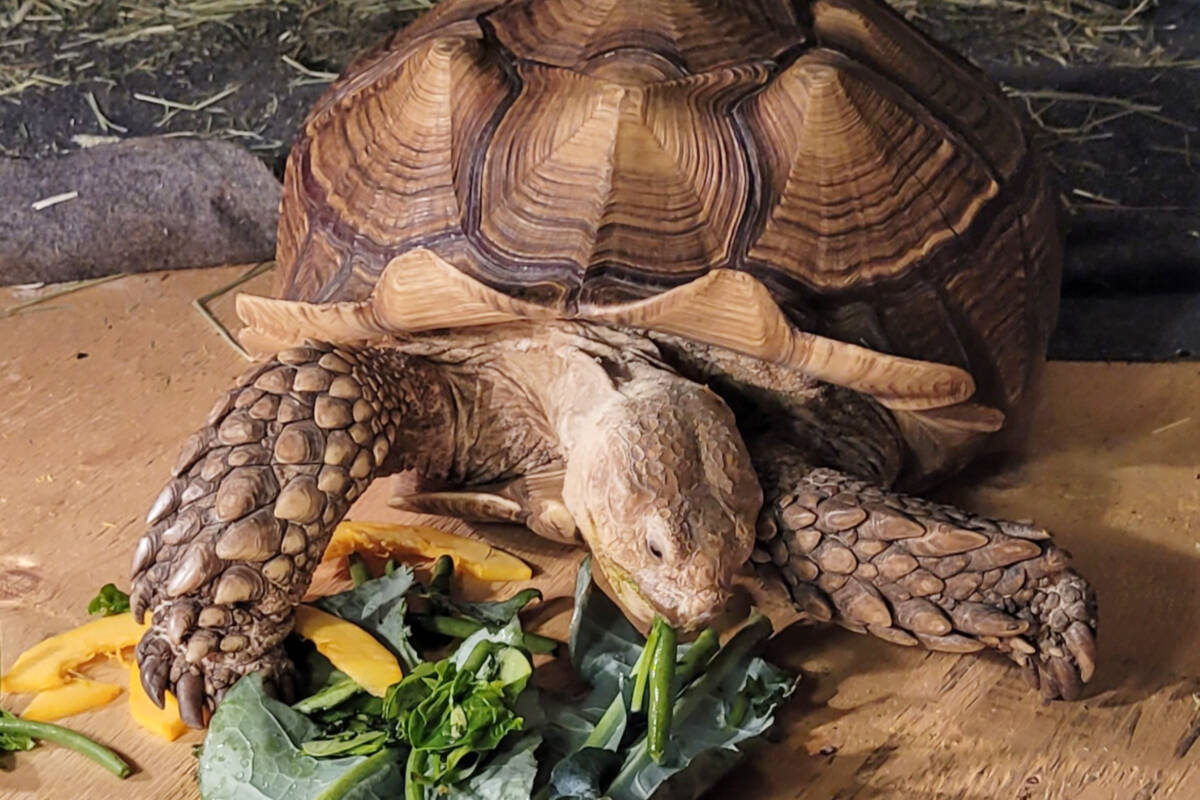A tortoise in the care of the Maple Ridge branch of the BC SPCA has finally found his forever home.
Frank The Tank, a sulcata tortoise typically found in Africa, was discovered roaming a field of lettuce in Richmond on Oct. 4 and turned into the BC SPCA.
He was transferred to the Maple Ridge branch on Oct. 12, and following specialized treatment and a stint in foster care, he took his first ferry ride to his new home on Monday, Nov. 27.
Branch manager Kahlee Demers said when Frank was first put into her team’s care, he was not in good condition.
Frank had an upper respiratory infection, he was wheezy, there was discharge on his face, and he also wasn’t eating, which was very concerning to Demers.
“We were quite worried for a little while,” she said, noting he had bad shell rot from being outside in addition to everything else.
He was put into foster care with Mark Vosper, regional manager for animal protection services with the BC SPCA, who gave Frank his original name.
Demers noted that the tortoise was transferred to Maple Ridge specifically to receive veterinary care from reptile specialist Dr. Adrian Walton at the Dewdney Animal Hospital, and he was put on daily antibiotics.
It is unknown where Frank came from. Demers explained sulcatas are not a native species to Canada and has assumed Frank either escaped from somewhere or someone abandoned him.
“But he was put up on stray hold and no one came forward for him,” she said.
However, it is not uncommon for sulcatas to escape their pens because they are so big, that they can “barrel through anything”, said Demers.
“They’re very, very strong,” she said, and can also dig very well.
READ ALSO: 39 dogs, 5 cats seized by SPCA from Island home filled with feces and urine
Sulcatas can live up to 150 years old and grow to be the size of a wheelbarrow and up to 200 pounds. The sulcata is the largest species of tortoise in Africa and the third largest in the world. Frank is still only a juvenile.
Demers guessed Frank was on his own for at least a few days but that they were very lucky he was discovered when he was because his breathing was not great.
Any person wanting to adopt Frank had to have a legacy plan, because it is very likely that a tortoise will outlive a person.
Frank’s primary diet was hay, supplemented with vegetables, like lettuce, as opposed to in Africa where these turtles would eat a lot of grass and native plants as they foraged for food, said Demers.
After sorting through hundreds of applications from right across the country, a perfect fit was found for Frank in B.C. where he will have access to a big backyard and an owner with experience.
“It was insane,” said branch manager Kahlee Demers, of all the applicants interested in adopting Frank.
However, she said, many applicants were not qualified to take the young tortoise, especially Frank’s species.
“They are not an introductory tortoise. We were looking for someone very specific who had experience, not only with tortoises but even sulcatas,” Demers said.
Any potential applicant had to have experience and knowledge of the species, and someone who knew what they were doing and what they were taking on.
ALSO: B.C. family says wolf-dog hybrid killed bulldog puppy at campground
“They need a very specific environment and a very specific enclosure,” said Demers.
“We were looking for someone who could prove they knew what he would need and how to contain him,” she said, about the enclosure both indoors and outdoors.
Sulcatas love to be outside and love to dig, but also need to be inside when the temperature becomes too cold.
Frank’s new owner even showed up with a massive, handmade, wooden box for his vehicle, in order to transfer Frank to his new home.
Demers hopes Frank’s new owner will enjoy his massive personality.
“He has special spots on his shell – because their shells are live – so you would scratch certain spots on his shell and he would do a little dance because you were tickling him,” she laughed. “He’s such a cool character.”
She said she will miss Frank, but she is happy for him.
Which is the same for all the animals at the SPCA.
“We grow so attached to all of them but at the end of the day we’re so focused on their happy outcome,” she said, adding that she jokingly tells each animal leaving through the front door, “I don’t want to see you come back here.”
“It’s always bitter-sweet, but always more sweet than bitter.”

